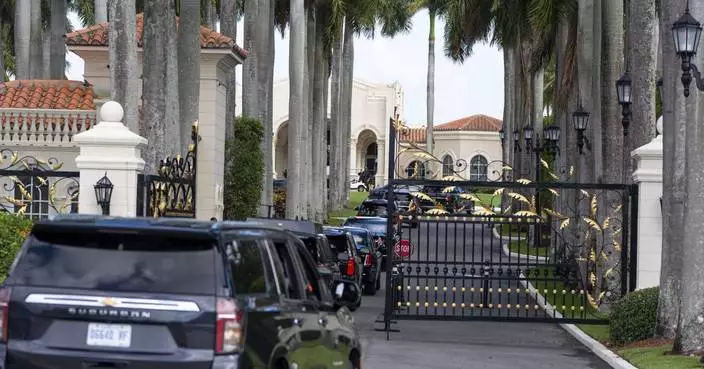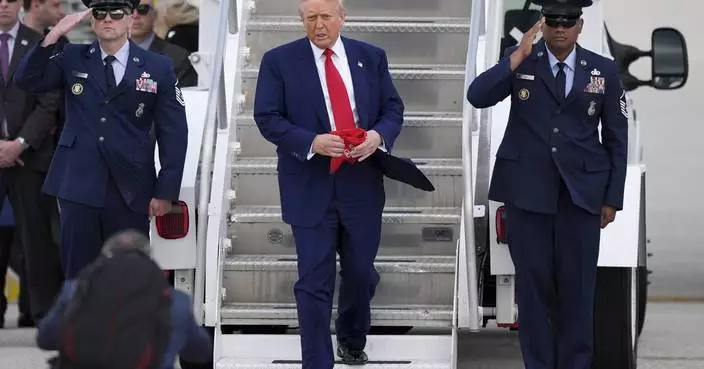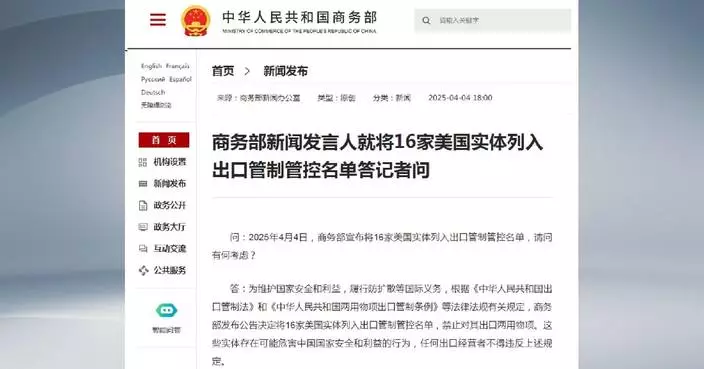TOKYO (AP) — Japan’s benchmark Nikkei 225 share index soared as much as 10.7% early Tuesday, a day after it plunged the most in 37 years.
The index gave up some of those gains as it wavered throughout the day but closed 10.2% higher at 34,675.46. Other Asian markets also were higher after sharp losses on Wall Street that were dramatic but not on the same scale as Monday’s 12.4% nosedive in Tokyo.
Many shares rose by double-digit percentages similar to their losses a day before, with automaker Toyota Motor Corp. rocketed 12.8%.
Computer chip maker Tokyo Electron jumped 16.6%, Honda Motor Co. advanced 14.7% and Mitsubishi UFJ Financial Group was up 5.8%.
The losses of the past several sessions followed a move by the Bank of Japan last week to raise its main interest rate from nearly zero. Such a move helps boost the value of the Japanese yen, but it also led traders to scramble out of deals where they had borrowed money for virtually no cost in Japan and invested it elsewhere around the world.
Officials from Japan's Finance Ministry, Financial Service Agency and the Bank of Japan met Tuesday to address the recent market gyrations.
Atsushi Mimura, a top ministry bureaucrat, declined to comment directly on the specifics of the market, as is government policy. But he noted that market experts were saying recent volatility reflects various global developments, and markets are going up and down elsewhere as well.
He cited geopolitical risks like rising tensions in the Middle East and recent economic data. He also pointed to increases in wages and investment in Japan.
“We maintain the view that the Japanese economy is gradually recovering, going forward,” he told reporters.
The government officials and the central bank reconfirmed their agreement to watch internal and external fiscal situation, and work together “as one,” said Mimura, vice finance minister for international affairs.
When asked, Mimura declined to comment on whether the recent BOJ rate hike had triggered the market's movements. He said the government was closely watching the foreign exchange rates and aiming for stability as always.
Various factors combined to cause Monday's carnage, according to Stephen Innes of SPI Asset Management, likening Tuesday's bounce to a “lifeboat.”
“As always with the market, take this to heart: Yesterday’s misery often turns into today’s punchline. The swift twists and turns of trading can transform what seemed like a dire situation into a fleeting memory, one that’s often laughed about in trading rooms the next day,” he said.
The Nikkei is now up 7.7% from a year ago, but more than 9% below its level three months ago. Its biggest ever percentage gain was 14.2% in October 2008.

FILE - People pass the New York Stock Exchange on July 30, 2024 in New York. Japan's benchmark Nikkei 225 stock index has lost 12.4% on Monday, August 5, 2024, in the latest bout of sell-offs that are jolting world markets. (AP Photo/Peter Morgan, File)
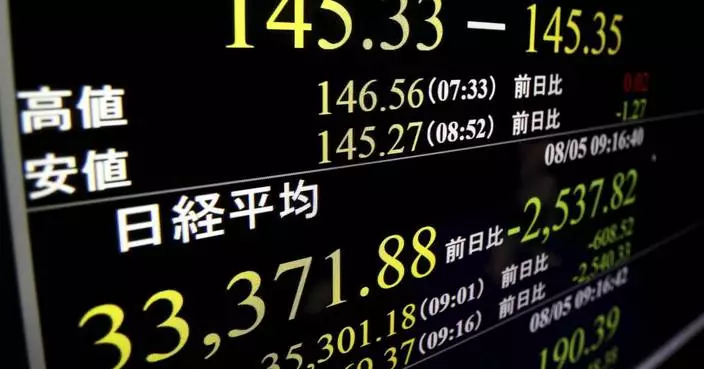
Japan's benchmark Nikkei 225 index soars more than 10% after plunging a day earlier
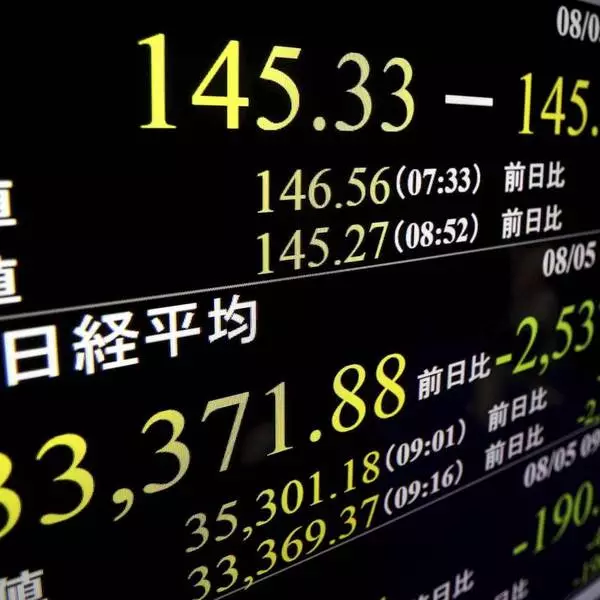
Japan's benchmark Nikkei 225 index soars more than 10% after plunging a day earlier
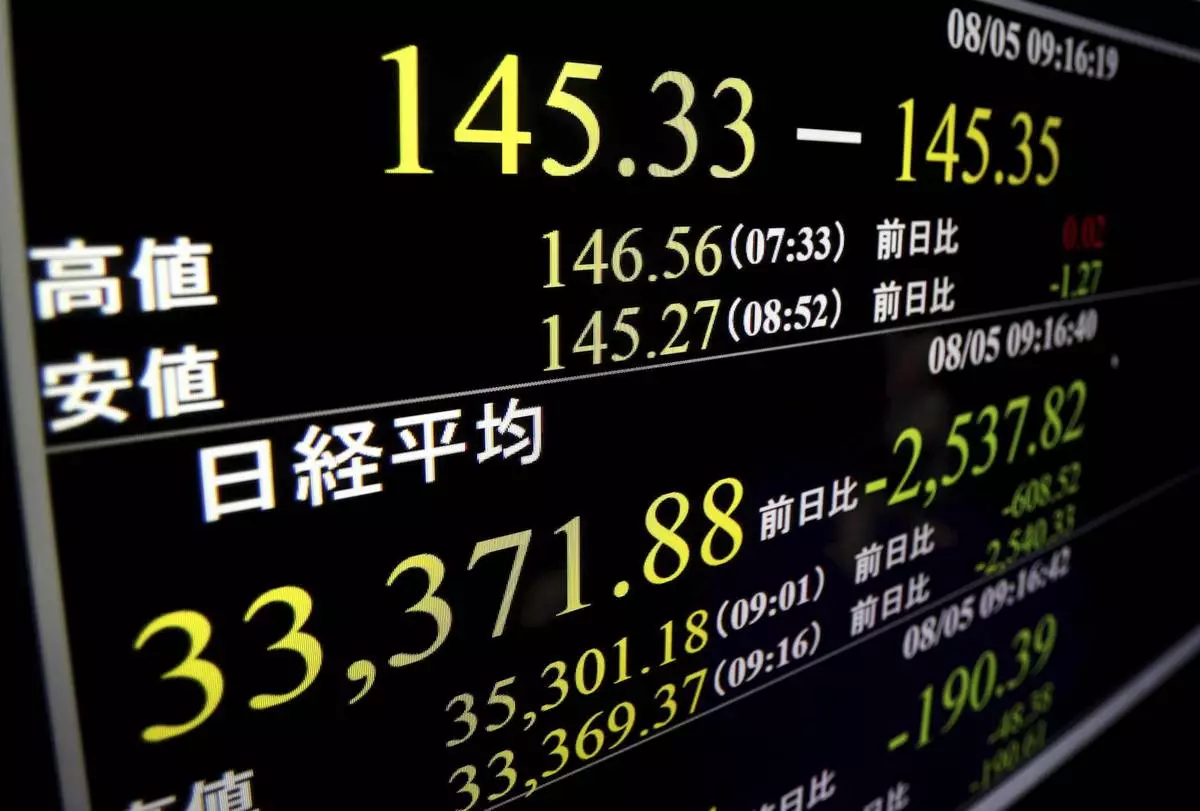
A monitor shows the Nikkei 225 stock index in Tokyo, Monday, Aug. 5, 2024, indicating at one point, over 2,537 points of lowering. (Shohei Miyano/Kyodo News via AP)
WASHINGTON (AP) — As stock markets tumble in the aftermath of President Donald Trump's sweeping tariffs, Republicans in Congress were watching with unease and talking of clawing back their power to levy tariffs — but almost none seemed ready to turn their words into action.
The Republican president is upending longstanding GOP principles like support for free trade, yet despite clear misgivings and a Constitutional mandate to decide tariffs, most lawmakers were not ready to cross Trump. Instead, they were focusing all their attention on advancing the president's " big, beautiful bill ” of tax breaks and spending cuts, even as tariffs — in essence, import taxes — threatened to raise consumer prices across the board and push the global economy into a recession.
As the fallout from Trump's announcement reverberated around global markets, Senate Majority Leader John Thune, who has made it clear he is no fan of tariffs, told reporters that he would give Trump "the benefit of the doubt” in hopes that the announcement was just a scare tactic to prod foreign leaders into negotiating better trade deals with the U.S.
“The president is a dealmaker if nothing else, and he's going to continue to deal country by country with each of them,” said Sen. John Barrasso, a Wyoming Republican who is no. 2 in GOP Senate leadership. He added that Treasury Secretary Scott Bessent had told Senate Republicans this week that the tariffs announced by Trump would be a “high level mark with the ultimate goal of getting them reduced” unless other countries retaliate.
But countries like China are already retaliating with tariffs of their own, and while the president has signaled he is open to negotiations, he was mostly sounding a defiant tone Friday, saying on social media that “MY POLICIES WILL NEVER CHANGE” while claiming that foreign investors were lining up to invest in U.S. industries. He was on the golf course Friday near his Mar-a-Lago private club in Florida.
Congress, however, was jittery.
A handful of Republicans have rebuked Trump's strategy as a foolhardy path that will burden U.S. households. Kentucky Sen. Mitch McConnell, the longtime Senate leader who was the standard-bearer for past generations of Republicans, released a lengthy statement saying, “As I have always warned, tariffs are bad policy, and trade wars with our partners hurt working people most.”
McConnell and three other Republicans joined with Democrats this week to help pass a resolution that would nullify Trump's tariffs on Canada, sending a rebuke to the president just hours after his “Liberation Day” announcement. But House Speaker Mike Johnson quickly indicated he has no interest in giving the resolution a vote.
Lawmakers' struggle to act showed the divide among Republicans on trade policy, with a mostly younger group of Republicans fiercely backing Trump's strategy. Rather than heed traditional free trade doctrine, they argue for “America First” protectionism and hope it will revive U.S. manufacturing.
Republican Sen. Josh Hawley said that workers in his home state of Missouri were “absolutely thrilled” with the tariffs. “We've been losing jobs left and right. Farmers want to see a fair deal for our products, both in Canada and in Mexico and from the (European Union)," he added.
For their part, Democrats slammed Trump's tariffs as a reckless maneuver meant to do nothing more than raise funds for the tax breaks Trump and Republicans are trying to pass.
“Why would he raise the costs on American families by $5,000, as it’s estimated? Simply because his very wealthy billionaire friends want a greater tax break,” Senate Democratic Leader Chuck Schumer said in a floor speech Friday.
Other Republicans were looking for roundabout ways to at least check the president's power on trade policy. Sen. Chuck Grassley, a senior Republican from Iowa, introduced a bipartisan bill Thursday that would require presidents to justify new tariffs to Congress. Lawmakers would then have to approve the tariffs within 60 days, or they would expire.
Although Grassley emphasized that he had long been working on the idea, the timing of the bill was notable. It gave Republicans a chance to talk about their distaste for import taxes and raised the prospect of Congress clawing back some of its power over tariffs. The Constitution gives Congress the responsibility of setting taxes and tariffs, but over the last century, lawmakers have ceded much of their power over import taxes to the president.
A handful of Republicans said they were favorable to Grassley's proposal, though the idea of directly defying Trump seemed to squelch potential for quick action.
“I don’t want to do it in a politically charged environment,” said Sen. Mike Rounds, a South Dakota Republican. “But I absolutely agree. This was set up by the Founding Fathers to be Congress’s role. And, I think we’re way past the point of what the Founding Fathers ever wanted to have happen."
Democratic Sen. Brian Schatz seized on the hesitation from Republicans, saying on social media Friday that the Senate would overwhelmingly repeal or constrain tariff authority “if every Senator voted their conscience and their state’s interest.”
“Mostly everyone hates this, they are just too afraid of the Mad King at the moment,” Schatz added.
Sen. John Kennedy, a Louisiana Republican, also predicted the bill would never pass “because of the voting requirements in the Senate.”
But he was still taking to social media to offer a folksy bit of advice: “Tariffs are like whiskey: A little whiskey, under the right circumstances, can be refreshing — but too much whiskey, under the wrong circumstances, can make you drunk as a goat.”
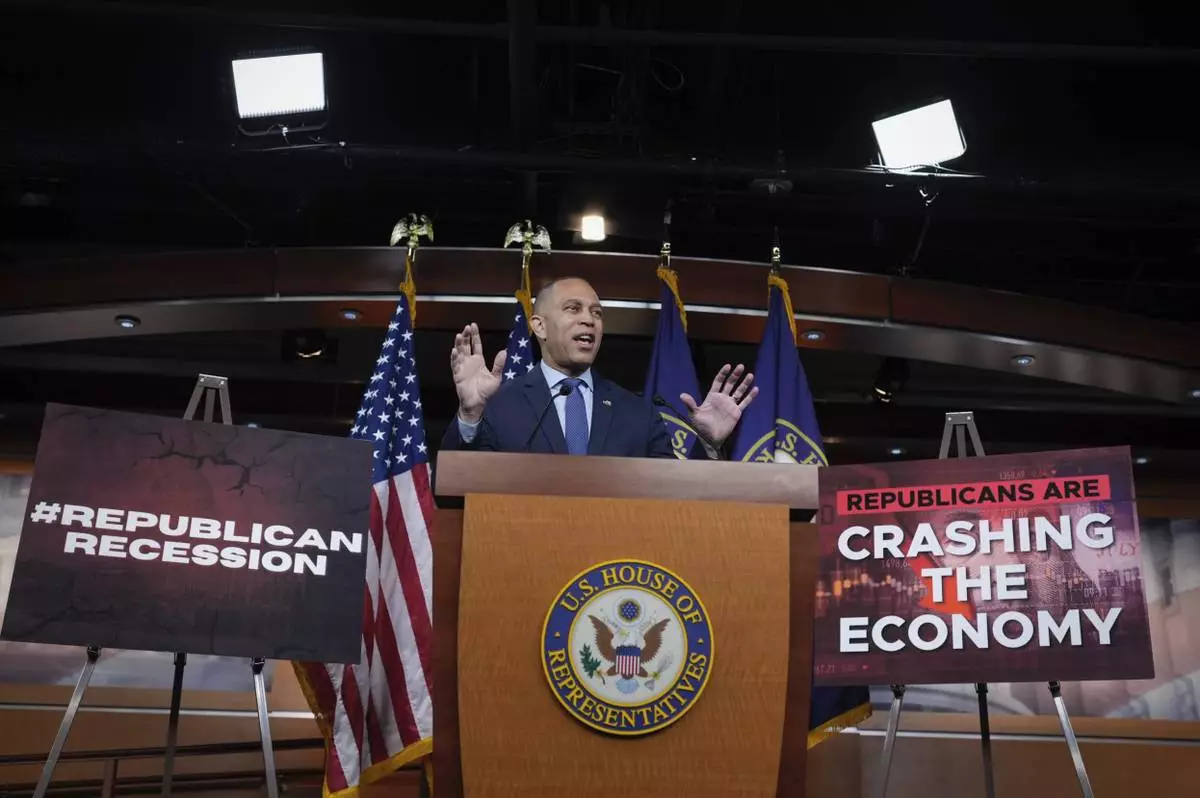
House Minority Leader Hakeem Jeffries, D-N.Y., criticizes the agenda of President Donald Trump and the tactics of billionaire Elon Musk in a pivotal Wisconsin election where Democrats won, during a news conference at the Capitol, in Washington, Wednesday, April 2, 2025. (AP Photo/J. Scott Applewhite)

Senate Minority Leader Chuck Schumer, D-N.Y., attends a news conference discussing the Republican-backed budget plan at the Capitol, in Washington, Thursday, April 3, 2025. (AP Photo/J. Scott Applewhite)
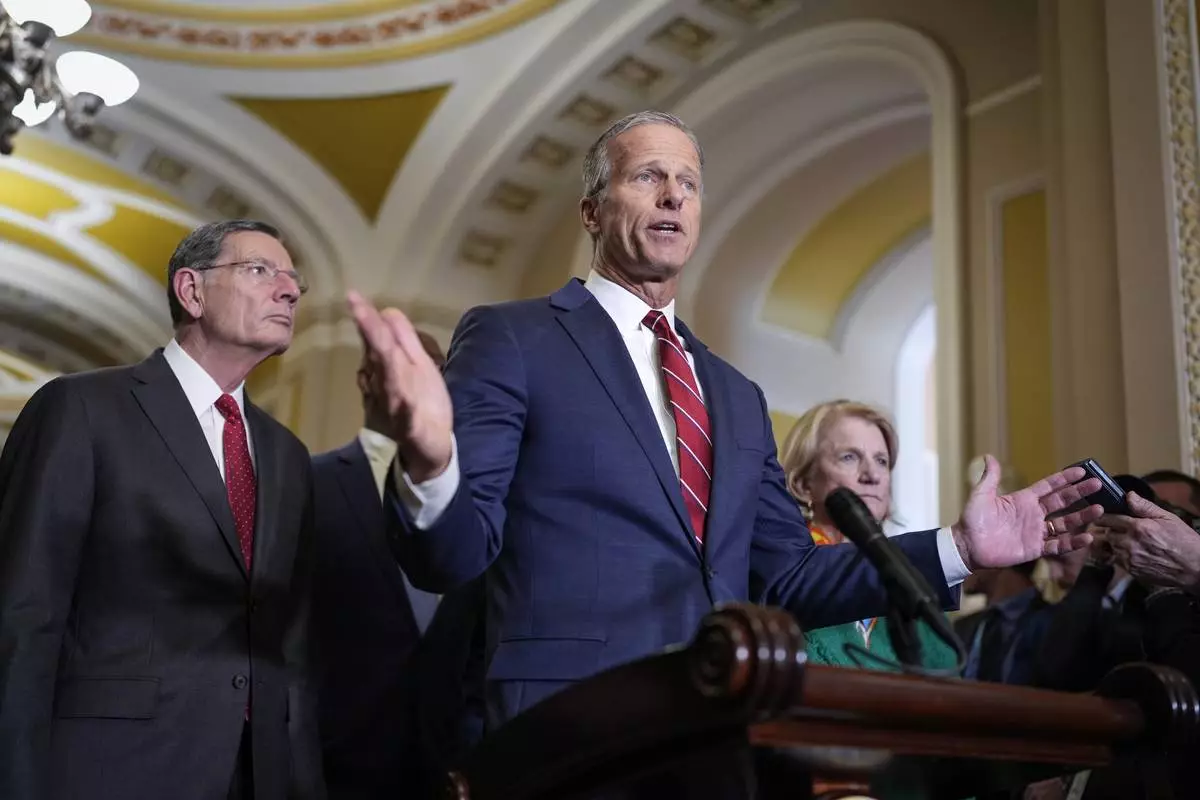
Senate Majority Leader John Thune, R-S.D., joined by Sen. John Barrasso, R-Wyo., the GOP whip, left, talks to reporters ahead of announcements by President Donald Trump on tariffs, at the Capitol, in Washington, Tuesday, April 1, 2025. (AP Photo/J. Scott Applewhite)

Speaker of the House Mike Johnson, R-La., talks with reporters as he arrives for a closed-door strategy session with fellow Republicans ahead of announcements by President Donald Trump on tariffs, at the Capitol, in Washington, Tuesday, April 1, 2025. (AP Photo/J. Scott Applewhite)
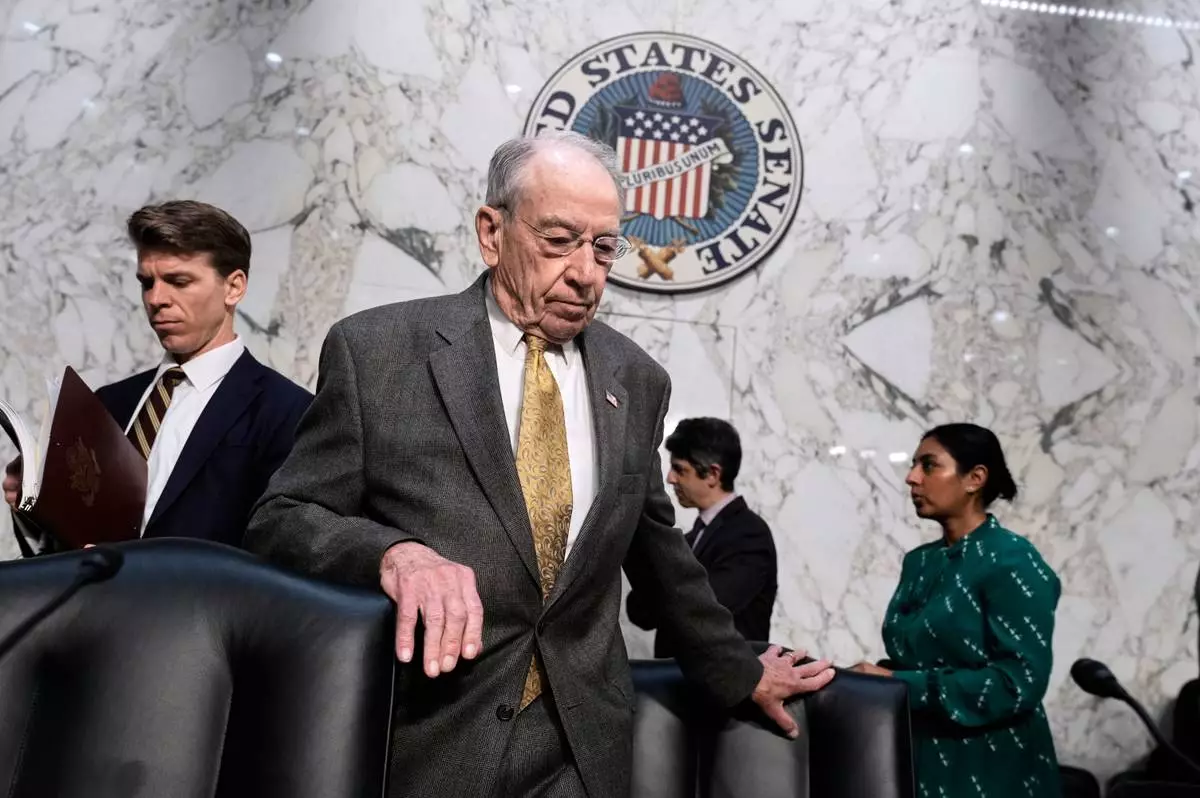
Senate Judiciary Committee Chairman Chuck Grassley, R- Iowa, takes his seat as the panel meets to consider prescription drug pricing and other measures, at the Capitol in Washington, Thursday, April 3, 2025. (AP Photo/J. Scott Applewhite)













